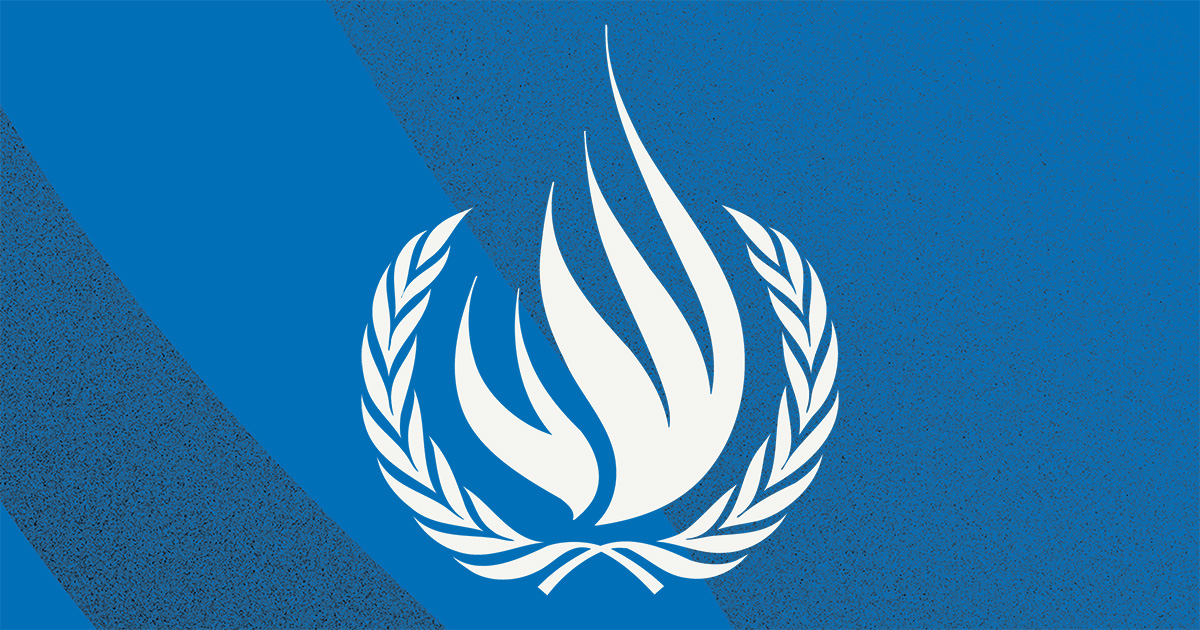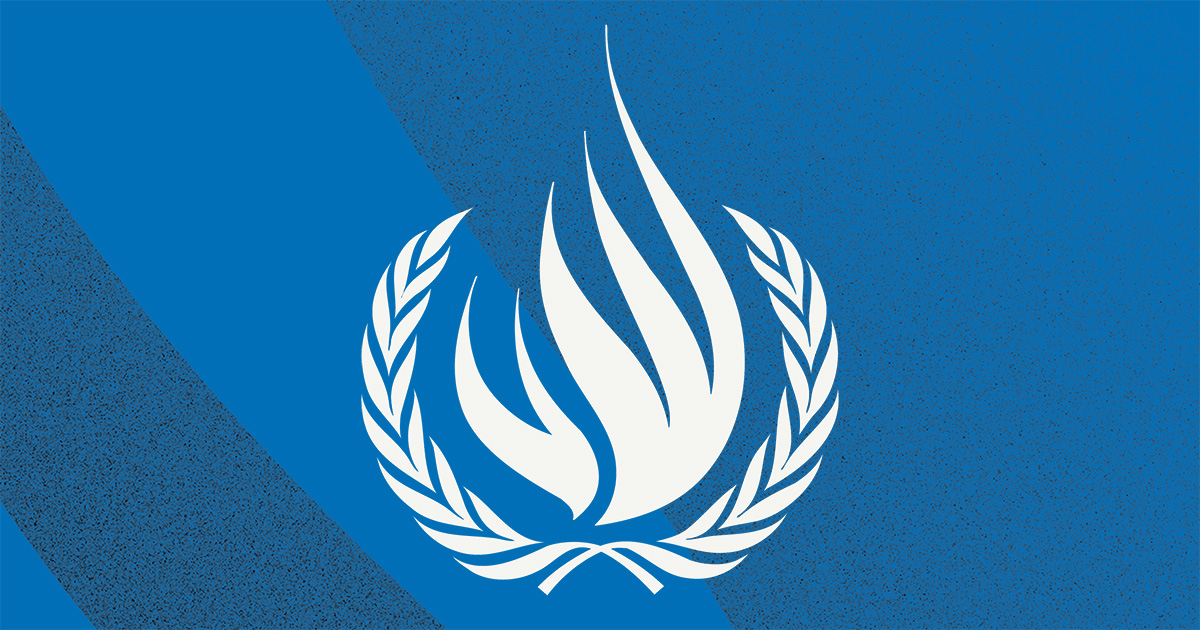
DELIVERED BY
United Nations High Commissioner for Human Rights Volker Türk
AT
Interactive Dialogue on Libya - 56th Session of the Human Rights Council
Madam Vice-President,
Excellencies,
Distinguished Delegates.
Less than a year ago, a horrendous tragedy struck the people of Libya.
Storm Daniel in Derna brought with it death and destruction at a catastrophic scale.
I pay tribute to the enormous resilience of all those rebuilding their lives in its aftermath.
Today, Libya stands at a crossroads.
Plagued by deep insecurity, its people continue to endure the misery of economic hardship coupled with political exclusion.
A stalled political process, hijacked by actors whose interests align in preserving the status quo, is decimating the hopes of Libyans for a more stable, open and thriving society.
Hopes they have had to carry for far too long, with little in return.
Our report (A/HRC/56/70) gives an insight into the state of human rights in the twelve months since April 2023 – and outlines the technical assistance and capacity building activities that we were able to provide, in close cooperation with the Human Rights, Rule of Law and Transitional Justice Service of the United Nations Support Mission in Libya.
This support, pursuant to Human Rights Council Resolution 52/41, is absolutely critical to improving the human rights situation in the country and implementing the recommendations of the then Independent Fact-Finding Mission on Libya.
Unfortunately, our ability to carry out these activities is impeded.
We encountered limited access to the southern and eastern parts of the country due to the volatile security situation; denial of access to detention facilities and other specific locations across the country; lack of cooperation from the authorities in eastern and southern areas; along with overarching challenges stemming from the political deadlock.
The ongoing regular budget liquidity crisis presented an additional challenge to our capacity to carry out our work.
Despite this, we were able to identify key areas where Libyan institutions and civil society needed human rights support, and to provide this in a targeted way.
This included contributing to the country’s first national human rights action plan, an important step for the implementation of a number of recommendations of the Independent Fact-Finding Mission.
We also supported victims, civil society and local communities to participate in the design of transitional justice processes and mechanisms, ensuring the inclusion of women’s voices and others traditionally excluded and marginalised.
And we supported authorities and other stakeholders involved in investigating and prosecuting human rights violations – with due attention paid to the challenging, yet crucial, task of identifying missing and disappeared persons.
Our report outlines some disturbing developments.
Three of which I wish to highlight.
First, an escalation in arbitrary arrests and detentions, enforced disappearances and detention-related violations.
Targeting of political opponents and dissenting voices across the country has accelerated since the termination of the Independent Fact-Finding Mission’s mandate.
While the figure is likely to be higher and arrests continue, we have verified at least 60 cases of arbitrary detention of individuals who peacefully were exercising their right to express political views. In some cases, detention was followed by extra-judicial killing.
Such repression is inflicting grievous suffering on the individuals concerned and their families – some of whom were subjected to arbitrary arrest and detention themselves.
It is also further eroding freedom of expression, association and assembly, in a context of deteriorating civic space and rule of law more generally.
All of this is corrosive to the prospects for healing Libya’s fractured social and political environment.
Especially as grievances around detentions were at the heart of the 2011 uprising.
Ongoing lack of accountability for those violations and abuses 13 years ago remains one of the serious obstacles to reconciliation today, and serves as a driver of conflict.
Second, we are seeing widespread human rights violations against migrants, refugees and asylum-seekers.
The dehumanization of these individuals who are in a vulnerable situation continues to take place at the hands of both State and non-State actors, often working in collusion.
Trafficking, torture, forced labour, extortion, starvation in intolerable conditions of detention. Mass expulsions. The sale of human beings, including children. Perpetrated at scale, with impunity.
And in March this year a mass grave was discovered in south-western Libya, containing at least 65 bodies presumed to be migrants.
As if this were not horrific enough, we are following up on reports of another mass grave recently discovered in the desert area at the Libyan-Tunisian border.
I urge the authorities to respond swiftly to our inquiries, and to investigate these crimes fully.
The loved ones of those who died have every right to know the truth.
And the responsibility for investigating these crimes falls squarely with the Libyan authorities.
Reparations must be made, justice served and nothing like this must ever happen again.
I urge Libyan authorities to adopt a comprehensive legal and policy framework on refugees and migrants that is in line with Libya’s human rights and refugee law obligations.
I also call upon the international community to review and, if necessary, suspend cooperation on asylum and migration with those authorities involved in human rights violations.
In the reporting period more than 2,400 people died or went missing trying to cross the Central Mediterranean Sea – an unbearable loss of life.
Of these individuals, more than 1,300 departed from Libya.
It is unconscionable that people in search of safety and dignity are suffering and dying in such unspeakable circumstances.
I remind all States of the collective responsibility under international law to save lives and prevent deaths at sea.
And I ask each of us to reflect on this ongoing, tragic loss of life - as well as the deaths of so many migrants and refugees on the perilous routes across the Sahara Desert towards the coast, as highlighted in a report published last week by UNHCR, IOM and the Mixed Migration Centre.
Third, I am concerned about ongoing delays in the transitional justice and reconciliation process.
I acknowledge how delicate and, by their nature, drawn-out these processes are – as well as efforts made so far.
I am troubled, however, about the persistent setbacks in adopting a reconciliation law and roadmap, denying countless victims their rights to truth, justice and reparation.
The continued marginalization of women, youth, victims and others from these important processes that will shape the country’s future is also deeply worrying.
Their meaningful participation is essential if these processes are genuinely to deliver on peace and prosperity for all Libyans.
Madam Vice-President,
The building blocks for securing a lasting peace in Libya are clear.
A rights-based, people-centred transitional justice and reconciliation process.
A sustainable political settlement that reflects the rights and aspirations of all Libyans.
The restoration of the rule of law, including accountability for human rights violations.
And the emergence of unified, legitimate institutions.
To that end, I urge the Libyan authorities to implement the recommendations in our report.
And I underline one decisive step: the adoption of a legislative framework to protect the right to freedom of assembly and association.
This would have a transformative effect in Libya.
The stifling of civil society organizations, political activists, journalists and many others is fostering a climate of fear.
It is also undermining the very foundations necessary for Libya’s democratic transition, emboldening the spoilers, and enabling security actors to perpetrate human rights violations with impunity.
A thriving civic space, where Libyans can engage in open and safe debate and dialogue, is essential to nurturing mutual understanding and fostering social cohesion.
It is critical for the political, electoral and national reconciliation processes.
Every Libyan must feel confident that they can engage in public life without fear of reprisal.
My Office is ready to continue our assistance to the Libyan people and authorities.
Under a new mandate, our efforts can help overcome roadblocks to the reconciliation process and support the implementation of the national human rights action plan.
Our ability to do this, though, will depend on greater cooperation from the Libyan authorities.
We are already seeing signs of this.
I had a positive meeting with the Minister of Justice yesterday and look forward to addressing detention-related human rights challenges with her Ministry.
Knowing just how important it is to address these issues for trust building between the people and the institutions of the State.
I also thank the Minister for the invitation to visit Libya.
As I am grateful to the Ministry and to the other Libyan authorities who have facilitated our activities under the previous resolution.
I welcome a strengthening of this cooperation under a renewed mandate.
Madam Vice-President,
Peace and stability in Libya go hand in hand with human rights.
A renewed technical assistance and capacity building mandate will allow us to work with authorities across Libya to identify solutions to the many human rights challenges facing the country.
By focusing on the collective interest, Libyan leaders can take the steps needed to restore hope in Libya for a more peaceful, just and secure life for all.
Thank you.










